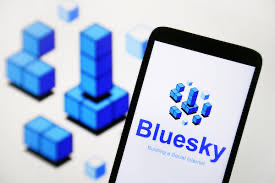As Twitter becomes more inhospitable to marginalized communities, they hope to shape Bluesky’s culture early — with their voices at the center.
Many of the Black, queer and transgender users who made Twitter a cultural touchstone are growing weary of the platform, which they say has become increasingly inhospitable to marginalized communities. They are instead flocking to Bluesky, a buzzy invite-only app that may be the alternative jaded Twitter users have been looking for.
Bluesky is in beta testing, meaning it’s not widely available yet; the company said it has about 50,000 users. The invitation system has reduced the risk of bad actors by limiting sign-ups and prioritizing people who bring in “trustworthy participants.” Some members of marginalized communities who are on it say they are cautiously optimistic that their early input will help create a tolerant environment as the app grows.
Black tech workers on Twitter were one of the first communities to migrate to Bluesky, an initiative spearheaded by an active user named Aveta.
“I just felt sad that many of my favorite people on Twitter were leaving and I didn’t get to interact with them and it just felt like a shell,” said Aveta, who asked to use her screen name to protect her privacy. “So I was, like, maybe by bringing them over to Bluesky, I can see them again.”
Aveta joined the platform on April 15. She said she was encouraged by how familiar it felt and the team’s support for community builders. She secured some invitation codes and set out to bring in as many people as possible. Her first objective was to get her community, Black tech Twitter, onto Bluesky.
“One thing that has remained consistent throughout all those years of social media was, at the core of the social media, Black people made it popular,” she said. She added: “We have such a huge impact on these networks, yet we are so often overlooked.”
Once Black Twitter users started moving to Bluesky, Aveta said, others wanted to follow.
“Black Twitter” — an unofficial group of users self-organized around shared cultural experiences that convenes sometimes viral discussions of social issues to pop culture — has played a key role in movements such as #SayHerName and #OscarsSoWhite.
In 2018, Black Americans accounted for an estimated 28% of Twitter users, roughly double the proportion of the U.S. Black population, according to the media measurement company Nielsen. As of last spring, Black Americans were 5% more likely than the general population to have used Twitter in the last 30 days — second only to Asian American users, it said.
Some signs indicate a slowdown among Black Twitter users that predates Elon Musk’s purchase of Twitter last year. In April 2022, the rate of growth among Black Twitter users was already slower than among any other ethnic group: 0.8% in 2021, down from 2.5% the previous year, according to estimates provided by Insider Intelligence eMarketer.
Aveta said she prioritized moving the Black tech community to Bluesky first to combine social appeal with technical knowledge.
“I really wanted us in because, alongside the dev team, we can help shape and mold it. We can help give a perspective that may have not been considered before,” she said.
The research firm Data.ai said that despite its invitation-only mode, Bluesky has ranked highly in download charts around the globe.
Aveta has instructed those who want her Bluesky invitations to have someone who can vouch for their characters, because she has built her Bluesky community with intention.
“The internet has good people, but it has very, very nasty people, and for me, when I’m inviting people and when I’m in that community-building mode, I will do everything in my power to make sure I keep them out,” she said.
Aveta has dubbed herself the “unofficial sky mama” because of the number of invitations she has doled out to new users. She estimates that she has given out nearly 1,000, but she has lost track of the exact number. After she brought her community in, Aveta extended her invitations to people of color, queer people and disabled people.
“Intersectionality matters to me,” she said.
Among those she invited were several members of Tech by Choice, a 1,200-member nonprofit group that helps marginalized communities enter and stay in the tech industry. Valerie Phoenix, 29, who founded and runs the organization, said: “Through her, I was able to get people from the Tech by Choice community onto the platform so that they can understand what’s going on and learn how to build for the platform, which I think is huge — to have developers of color that are underrepresented trying to build for a new platform.”
Phoenix, who goes by @DigitalBlkHippy on Twitter, said that Twitter has become more of an obligatory part of her social media presence — announcements and professional interactions, for example — since Musk took over and that she finds herself engaging more with community on Bluesky. The hands-on moderation on Bluesky makes her feel safe, she said, and she’s encouraged by the feedback the Bluesky team solicits.
“It seems to be the opposite direction when it comes to moderation on Twitter,” she said.
Queer and trans users have also taken to Bluesky, quickly becoming a sizable part of it. Alejandra Caraballo, a clinical instructor at the Harvard Law School Cyberlaw Clinic and a trans rights activist, said one of the best parts about Bluesky, compared to Twitter, is that she can post normally without immediately getting an influx of transphobic remarks or death threats.
“It was really nice to post stuff in a place that was so queer- and trans-friendly,” Caraballo said. “Also, it was very sex worker-positive, and it just overall had very good vibes. It was just refreshing, and it reminded me what social media actually could be.”
Caraballo said Bluesky’s unique corporate structure as a public benefit limited liability company may have an impact on the app’s culture moving forward. A public benefit LLC allows executives to pursue social causes without prioritizing shareholder returns.
“What that does is allow a company to have more leeway to protect its users without necessarily having to have a business rationale behind its policies,” she said.
Pariss Chandler, the organizer of Black Tech Twitter and the founder of the recruitment platform Black Tech Pipeline, said diversity, equity and inclusion should be considered early in a platform’s launch. The prominence of marginalized communities in Bluesky’s beta testing is valuable for the developers who are building the app, she said.
“They are really lucky to have all of these different communities on there, especially marginalized communities, because they’re getting feedback immediately,” Chandler said. “It’s like you’re getting different feedback from different experiences, different wants and needs and features people would like to see on the platform and why those things are important, especially when it comes to safety and moderation.”
Chandler said the developers’ quick responses to feedback or issues are a “beta experience,” because the platform isn’t widely available. However, once Bluesky becomes accessible to everyone, she said, moderation will be harder to address.
Caraballo agreed that scaling up Bluesky’s moderation will be a challenge but said the actions of its current user base may dictate user expectations moving forward.
“The most effective moderation is going to be community and social norms, like what is and isn’t OK to do,” she said. “And by establishing early that harassment and anti-social behavior is not really going to be tolerated, it can really kind of build up a specific type of community.”
Jasmine Enberg, a principal analyst at eMarketer Insider Intelligence, said the challenge will be to maintain the same sense of comfort for users as Bluesky scales up.
Although the app has many similarities to Twitter, its key difference is that it is decentralized. That means user data can be stored on independent servers rather than on one owned by the company. In the future, users will be able to develop their own servers to use with communities of their choosing.
For now, most users interact on one main feed. As the servers splinter, it could result in communities that have more autonomy to punt trolls — or a more complicated, and less attractive, interface for potential new users.
“It’s easier right now because it’s smaller, right?” she said. “But overall, it is the closest thing we have to a near-perfect replica of Twitter and, right now, without many of the challenges.”
Bluesky didn’t immediately respond to a request for comment. In its moderation plans on its website, it says that as it grows, it will use “automated filtering, manual admin actions and community labeling” to moderate content.









